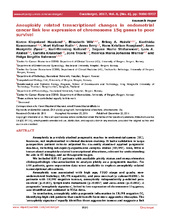Aneuploidy related transcriptional changes in endometrial cancer link low expression of chromosome 15q genes to poor survival
| dc.contributor.author | Mauland, Karen Klepsland | en_US |
| dc.contributor.author | Wik, Elisabeth | en_US |
| dc.contributor.author | Høivik, Erling Andre | en_US |
| dc.contributor.author | Kusonmano, Kanthida | en_US |
| dc.contributor.author | Halle, Mari Kyllesø | en_US |
| dc.contributor.author | Berg, Anna | en_US |
| dc.contributor.author | Haugland, Hans Kristian | en_US |
| dc.contributor.author | Øyan, Anne Margrete | en_US |
| dc.contributor.author | Kalland, Karl-Henning | en_US |
| dc.contributor.author | Stefansson, Ingunn Marie | en_US |
| dc.contributor.author | Akslen, Lars A. | en_US |
| dc.contributor.author | Krakstad, Camilla | en_US |
| dc.contributor.author | Trovik, Jone | en_US |
| dc.contributor.author | Werner, Henrica Maria Johanna | en_US |
| dc.contributor.author | Salvesen, Helga Birgitte | en_US |
| dc.date.accessioned | 2017-08-03T11:16:26Z | |
| dc.date.available | 2017-08-03T11:16:26Z | |
| dc.date.issued | 2017 | |
| dc.identifier.issn | 1949-2553 | |
| dc.identifier.uri | https://hdl.handle.net/1956/16193 | |
| dc.description.abstract | Aneuploidy is a widely studied prognostic marker in endometrial cancer (EC), however, not implemented in clinical decision-making. It lacks validation in large prospective patient cohorts adjusted for currently standard applied prognostic markers, including estrogen/progesterone receptor status (ER/PR). Also, little is known about aneuploidy-related transcriptional alterations, relevant for understanding its role in EC biology, and as therapeutic target. We included 825 EC patients with available ploidy status and comprehensive clinicopathologic characterization to analyze ploidy as a prognostic marker. For 144 patients, gene expression data were available to explore aneuploidy-related transcriptional alterations. Aneuploidy was associated with high age, FIGO stage and grade, non-endometrioid histology, ER/PR negativity, and poor survival (p-values<0.001). In patients with ER/PR negative tumors, aneuploidy independently predicted poor survival (p=0.03), lymph node metastasis (p=0.007) and recurrence (p=0.002). A prognostic ‘aneuploidy signature’, linked to low expression of chromosome 15q genes, was identified and validated in TCGA data. In conclusion, aneuploidy adds prognostic information in ER/PR negative EC, identifying high-risk patients that could benefit from more aggressive therapies. The ‘aneuploidy signature’ equally identifies these aggressive tumors and suggests a link between aneuploidy and low expression of 15q genes. Integrated analyses point at various dysregulated pathways in aneuploid EC, underlining a complex biology. | en_US |
| dc.language.iso | eng | eng |
| dc.publisher | Impact Journals | eng |
| dc.relation.ispartof | <a href="http://hdl.handle.net/1956/16202" target="blank"> Context-related biomarkers in endometrial cancer. A study with focus on obesity and genomic alterations</a> | |
| dc.rights | Attribution CC BY | eng |
| dc.rights.uri | http://creativecommons.org/licenses/by/3.0/ | eng |
| dc.subject | Endometrial cancer | eng |
| dc.subject | DNA ploidy | eng |
| dc.subject | Prognosis | eng |
| dc.subject | transcriptional alterations | eng |
| dc.subject | chromosome 15q | eng |
| dc.title | Aneuploidy related transcriptional changes in endometrial cancer link low expression of chromosome 15q genes to poor survival | en_US |
| dc.type | Peer reviewed | |
| dc.type | Journal article | |
| dc.description.version | publishedVersion | en_US |
| dc.rights.holder | Copyrigh the authors | |
| dc.identifier.doi | https://doi.org/10.18632/oncotarget.14201 | |
| dc.source.journal | OncoTarget | |
| dc.source.40 | 8 | |
| dc.source.14 | 6 | |
| dc.source.pagenumber | 9696-9707 |

